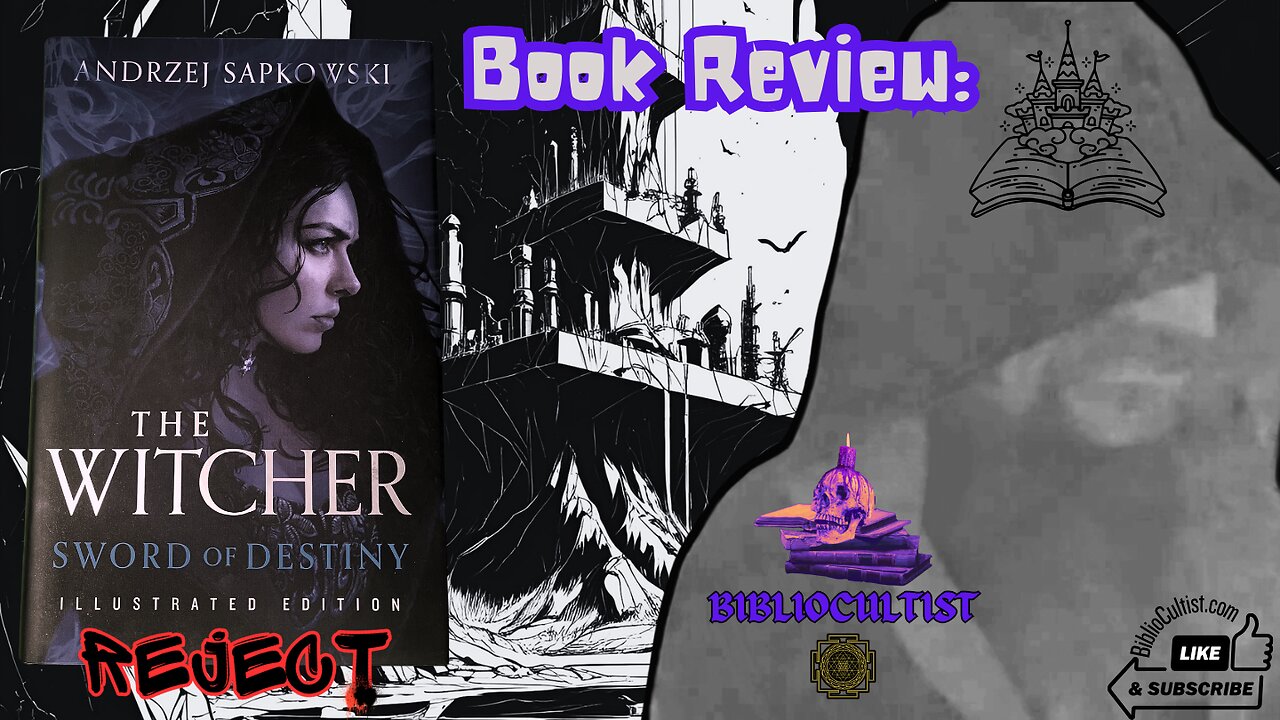Premium Only Content

Why Sword of Destiny Fails as 'Mature' Fantasy
*CHECK OUT MY MERCH: https://bibliocultist.printful.me/*
In this #reject #bookreview, I delve into Andrzej Sapkowski's The Witcher: Sword of Destiny, expressing disappointment with the book's overuse of tropes, lack of depth in characters and philosophical insights, and poor dialogue. Initially, I thought it was a satirical take on fairy tales, but realized it was meant to be taken at face value. The main characters, Geralt and Yennefer, come across as unlikable and superficial. Ciri is even more of a puzzle that one doesn't seem inclined to solve. While the book may appeal to a younger audience, I feel it lacks substance for adult readers, falling short in terms of character development, intellectual exploration, and originality.
*all music and content copyright BiblioCultist.com*
#SwordOfDestiny #TheWitcher #WitcherBooks #FantasyReviews #BookCritique #OverratedBooks #AndrzejSapkowski #UnpopularOpinion #FantasyFlops #WitcherFans #BookTube #ReadingRant #FantasyTropes #GeraltOfRivia #Yennefer #booktube #books #biblio #cultist #booktok
**SHOW NOTES**
1. Andrzej Sapkowski (born 21 June 1948) is a Polish fantasy writer, best known for *The Witcher* series. His books blend Slavic mythology with dark, political storytelling. Originally a success in Poland, Sapkowski's work gained global fame through CD Projekt Red's *Witcher* video games and Netflix's adaptation. He remains a defining figure in modern fantasy.
2. The European fairy tale genre emerged from ancient oral traditions, blending folklore, pagan myths, and medieval morality tales. Early written versions, like Charles Perrault's *Mother Goose Tales* (1697) and the Grimm Brothers' collections (19th century), refined these stories for literary audiences. Rooted in peasant culture, fairy tales often encoded societal fears (wolves, witches) and ideals (chastity, cunning). They served as both entertainment and covert lessons, with recurring motifs—magic, transformation, and trials—reflecting universal human struggles. The genre's timeless quality stems from its adaptability, as tales were reshaped by Christian, Romantic, and nationalist influences across centuries.
3. Modernism and Postmodernism, as philosophical and cultural movements, systematically eroded transcendent meaning, breeding cynicism and nihilism in the Western mind. Modernism, with its fetish for progress and rejection of tradition, reduced truth to materialist frameworks, severing man’s connection to the sacred. Postmodernism then dismantled even these fragile certainties, declaring all truths relative, all narratives oppressive fictions. Where Modernism still clung to rationality, Postmodernism reveled in fragmentation, reducing reality to a carnival of empty signs. Together, they created a spiritual wasteland—a world where irony replaces conviction, deconstruction replaces wisdom, and the self, unmoored from any higher order, drifts in a void of its own making. This is not liberation, but the final triumph of decadence: a civilization that no longer believes in anything, not even itself.
4. Social Darwinism refers to the application of Darwinian concepts—such as natural selection and survival of the fittest—to human societies, often to explain or justify social inequality, competition, and hierarchical structures. Emerging in the late 19th century, it influenced political and economic thought, with some using it to advocate for laissez-faire capitalism, colonialism, or eugenics. Critics argue it oversimplifies Darwin’s biological theories by ignoring ethical and cultural dimensions, while supporters historically saw it as a rationale for progress. The term itself is contentious, as Darwin did not endorse its societal extrapolations. Today, it is primarily studied as a historical ideology with complex legacies in science, politics, and philosophy.
-
 2:35:13
2:35:13
BlackDiamondGunsandGear
4 hours agoAFTER HOURS ARMORY / BUILDING GUNS ARE ILLEGAL? / Marine Gun Builder RETURNS!!
13.5K2 -
 2:05:19
2:05:19
Damysus Gaming
4 hours agoARC Raiders - SERVER SLAM TIME!!!! LFG!!!
25.1K -
 1:04:10
1:04:10
The Connect: With Johnny Mitchell
7 hours ago $3.33 earnedTucker Carlson's INSANE Take On Civil War In America, Calls For Fascism
18.6K30 -

DLDAfterDark
6 hours ago $3.30 earnedThe Return of Marine Gun Builder? MGB, DLD, BDG&G After Hours Armory
20.9K3 -
 28:39
28:39
Afshin Rattansi's Going Underground
1 day agoDonald Trump’s Gaza Peace Plan: A Pivotal Moment or Farce? (Palestinian Deputy Foreign Minister)
27.4K6 -
 3:31:29
3:31:29
SavageJayGatsby
7 hours ago🔥 Spicy Saturday – Let's Play: Prison Life 2🔥
45K2 -
 4:34:18
4:34:18
cosmicvandenim
13 hours agoCOSMIC VAN DENIM | WARZONE HORROR
18.8K1 -
 29:09
29:09
Stephen Gardner
11 hours ago🚨Trump DECLARES WAR on TERRORIST LEFT!
31.3K56 -
 4:16:00
4:16:00
NellieBean
6 hours ago🔴 Lost Girl looks for Lost Village
9.48K -
 30:07
30:07
JohnXSantos
1 day ago $1.02 earnedWhy Clothing Brands NEVER Fail- Master Class
8.53K